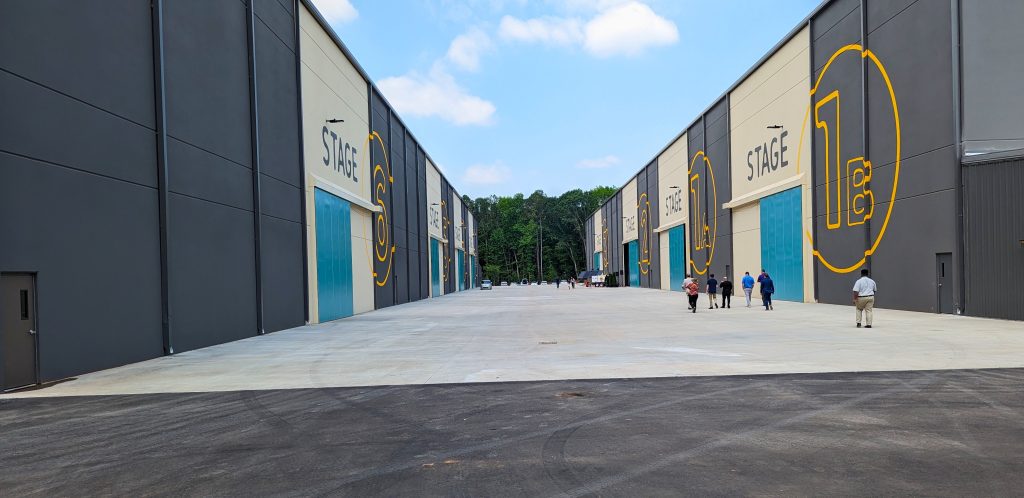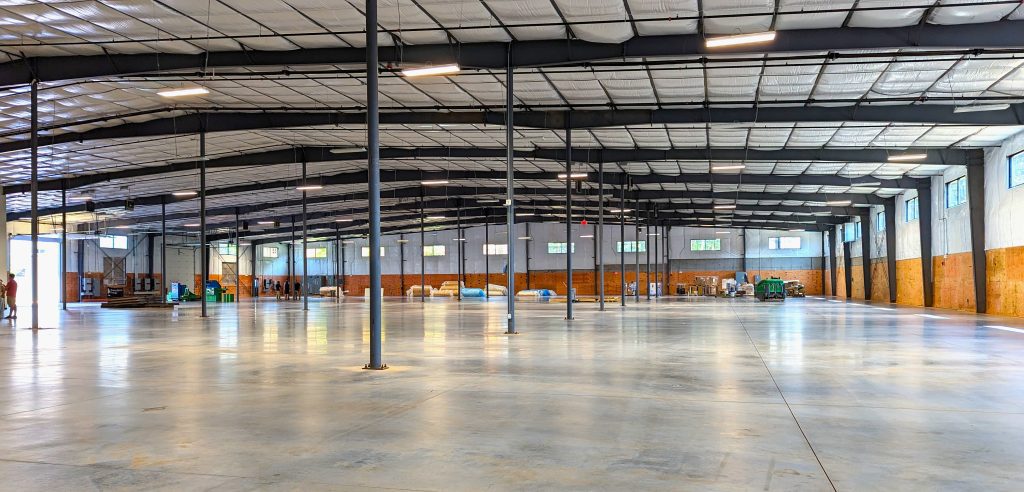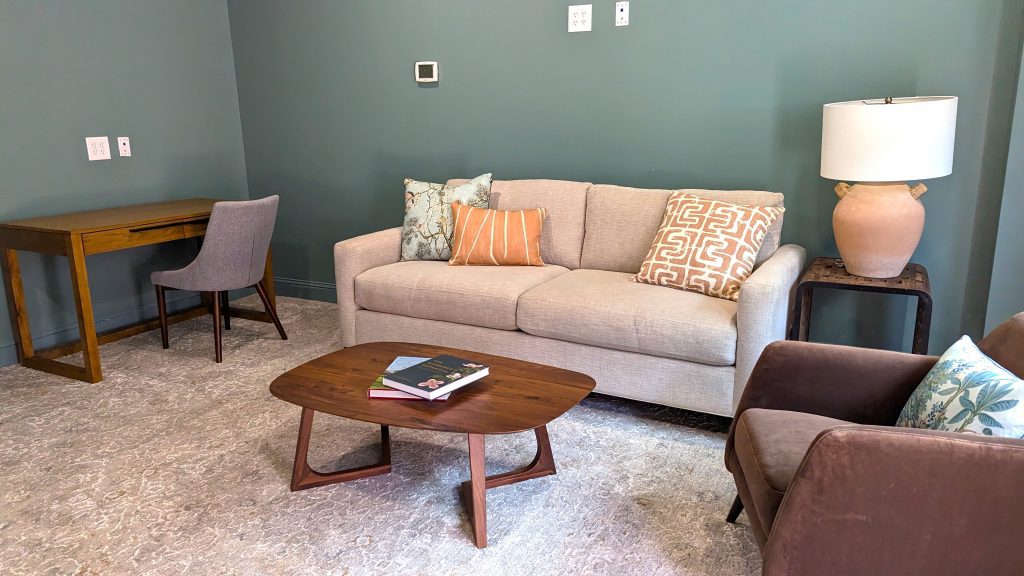Electric Owl Studios is the newest film studio in Atlanta, GA. Not only that, it is also LEED Certified Gold, making it the greenest studio in not just Georgia but the entire world. The studio was built from the ground up with sustainability in mind. I had the opportunity to speak with co-founders Michael Hahn and Dan Rosenfelt ahead of their June grand opening. We discussed what Electric Owl Studios brings to Atlanta, a city already filled with many, many studios, its green initiative, and the film industry in general.
First off, I want to say congratulations about the new studio. Well done. So, tell me about Electric Owl Studios. What inspired you to want to open up a film studio? I know both of you have been in this business before, So what made you want to open up this studio now?
Michael Hahn: Dan and I are co-founders. We’re co-owners. It really takes three elements from a 50,000 level view. You have to have an operator, which is Dan. You have to have a developer that knows what they’re doing, which is me. And then you have to have a capital partner, which is Domain Capital who’s our other partner in all of these investments. So we felt like we had this great team that Dan and I put together, and really that’s what inspired us to go out and really make this a business that we knew was going to be successful. Really, that’s the top top line. In terms of values of our company, I’ll let Dan talk about about that a little bit here, but on the most basic level, I think Dan is going to be the soul of Electric Owl, and I’ll let him talk a little bit about what inspired us from that perspective and and how we’re going to operate the studio here.
Dan Rosenfelt: I been running studios for about 12 years now and been in the film industry for 24 years, and I love it so much. When Michael and I worked together at Third Rail Studios it was a great experience and a successful studio. And at one point, we started to talk about what’s next and what could be even more special. I like that word ‘soul’ that Mike just use because we do put our souls and our full emotional effort into these things. I do. I love it so much; love the product, love film and tv. It’s been very meaningful to me in my life. And then there’s this great…we kind of looked at the studios around the world and saw certainly a little bit of a gap in sustainability. We’re really the first studio to approach what we do with sustainability built into our DNA, just really baked in. We did that not as a marketing tool, although certainly our production clients who we’ve been speaking with are excited about it. We did it because there’s a halo effect with when you put a movie studio into a town for a certain city, there’s this kind of nice halo effect that we call it, that’s a lot of positivity and excitement surrounding that business. So we just thought that having a green studio and being kind of thought leaders on that front would be an incredible step forward for the industry in general. And we also do a lot of community work.
We love to utilize people’s excitement about entertainment to do internship programs and help people get jobs after their internship programs. Love mentoring people. And we love giving money and/or time to local non-profits, mostly in the arts but certainly in the green space as well. So we just thought that there was a lot of positivity that we could bring with the new studio and if we had our own place that was our creation, that we could start from scratch, that we could infuse it with all these things that we wanted to. So that was the impetus for it. But really also our productions have been moving forward on the green space so much and yet studios like ours have not, so we wanted to go full force into it. We just can’t wait until we open the doors.
Hahn: Other types of real estate development that I’ve done obviously do not attract as much attention as a film studio development, so really using that attention, as Dan said, for good, whether it’s sustainability, whether it’s internship programs inspiring people, we just draw a lot of attention, and I think Dan has set up what we do, not just as a successful business, but as a way to do good and whatever community that we we end up landing landing in.

Definitely! I love the fact that you guys are green and that that’s one of the main pillars of the studio. I’d like to talk more about that. What does it require? I know LEED certified terms are being thrown around a lot. Can you tell me about that?
Hahn: So there’s so there’s a list of goals that you have to meet in order to get LEED certification, and there’s different levels of LEED certification. I think Gold is the second highest, Dan you might want to correct me if I’m wrong about that. We’ve had to work with a consultant. We have to be certified by the National Green Building Council. We thought it was a good way to communicate our sustainability without having necessarily to list everything, though we do do that on our website. It’s a quick way to communicate to people that we are a certified green facility by the leading green certifier in the world.
Rosenfelt: And then also it’s important because to get a LEED certification you’re required to basically go through a very large list of things and check them off, and to get the certification you have to add up points for doing things on that list. So it ensures that your infusing the property or the building, for us it’s the entire property, every building and the whole property, with as many green elements as we could. There are some companies out there who do what’s called green washing, where they’re kind of like paying money to buy carbon offsets and things like that, but they’re not really doing anything. So the LEED certification kind of ensures that you are infusing as much as you can into your property. That was the goal there. It’s an every evolving thing too. Just because we’re opening our door soon doesn’t mean we’re not going to put additional features in as we go too.
Michael was able to, as a developer, really figure out ways to infuse the place with all of this stuff at not as high of a premium as people might think. That was important because obviously, you’re building, you have a budget, and you can’t just throw things in and just say yes to every single thing. But we packed a lot of stuff in there in very smart ways, and it allows us, one of our goals for being green was to not have to charge our productions anything for the green elements. Producers love it, but they also say, “What’s it going to cost me?” And our answer is nothing. In fact, it’ll save them money by our solar offsetting electricity use and things like that. We have water bottle refilling stations and filtered water in every office and every production space, so they don’t have to rent those water coolers and have a truck bring water coolers every month. Things like that. So it’ll actually cost them less than it normally would.

That’s what I was gonna ask. How will it impact the actual filming process for these productions. It looks like it’ll actually help them more.
Rosenfelt: Yes. We didn’t want to utilize it in any way other than as a true amenity. You walk in the doors, we’ve agreed on a lease with the production, and they get to utilize the beautiful facility that has many amenities, including green amenities. But yeah no fees and no kind of à la carte like, “Oh, if you want to plug into our 48 EV stations, it’s X amount per station.” Everything’s just included, and they could use everything the way they want to.
What are you guys most excited about for the studios to use that you offer? Like what are you most excited to see these productions use at your studios?
Hahn: I mean this is gonna sound lame, but the whole place as a, kinda what we consider it, kind of like a boutique/hotel for movies and tv shows. We tried to not only infuse it with as many green elements as possible but also just things that not every studio does right off the bat for each department that comes in. So over the course of the past couple years as we developed this and looked into it, we spoke to department heads in wardrobe, in construction, in art department, in production, and said, “What are studios lacking?” We collected that data and really crunched it and then added almost all of it as we got it. I’m really proud that we have a wardrobe building that is 35,000 square feet on the first floor. It’s 20,000 square feet plus two really huge purpose built laundry facilities that are well ventilated and will allow the wardrobe department to not only launder clothes but age and dye them, which they need to do in each production and do it in a really safe way with the air filtration and the natural air allowing it to circulate and overhead fans.
So I’m excited that we’re giving them that kind of space, and we tried to do that for every department, you know, provide enough power and provide purpose built catering space where it’s not just something they jam into but that it’s made for them. We put in these nice sinks for the catering team to wash their pots and pans, which they often aren’t given. So little elements like that are exciting to me. And I love that we have 48 EV plugin stations, too. They might not all used right away but they will soon enough.
Rosenfelt: I would also add one of the things I’m sort of excited about here that for the green rooms which, you see them in California sometimes, not so much in Georgia. Sometimes the stars have their own trailers that they like to be in but we’re going to provide green rooms on site that are going to be five star hotel quality spaces with with places for the talent to be when they’re not on the set with full bathrooms, etc. So we’re excited to see how that will work in this market as we get started.

That’s awesome. Tell me about Atlanta and the film community here. Obviously over the past decade or so, we’ve seen Atlanta grow into this massive film hub. What do you enjoy most about the film community here in Atlanta?
Rosenfelt: After being in LA for 15 years in the industry, which I also loved and this is not a knock on it at all, but I will say that the Atlanta film community, the Georgia film community at large, is ultra connected and a very jovial kind of familial group. I haven’t really seen that in my career before where when I moved here I was welcomed with open arms and tried to join as many groups or speaking panels or board of directors, wherever asked, if someone wanted me there. But I’ve never seen a as tight a knit film and TV industry as I’ve seen here. People support each other, even people who are supposed to be in competition with each other. That might be other studios here or vendors. There’s a lot of work to go around and there’s a lot of people who just love this industry.
So for me that’s been the most joyous kind of thing about living here. I literally run into a lot of the same people all the time at events and it’s always good to see them. We always share information about what’s going on in the industry or what projects are floating around. And it really is a very strong industry as far as not only connectivity but we have everything these productions need. We have the best vendors in the world for grip and lighting, for heavy lifts, and supplemental AC, and things just to run a facility like cleaning companies and waste management companies. We have them. I think that this is the best in the world, or at least we can match the best in the world here, and everyone’s very closely connected. So that’s really friendly environment and I hope it stays that way.
Electric Owl Studios is now officially open, and while no production currently occupies the studio they are talking with multiple productions. Shakefire was on site for the ribbon cutting and got to tour the facilities. Check out our gallery from the grand opening ceremony for more details on what Electric Owl Studios has to offer.
We can’t wait to see what films and shows come out of the studios!







